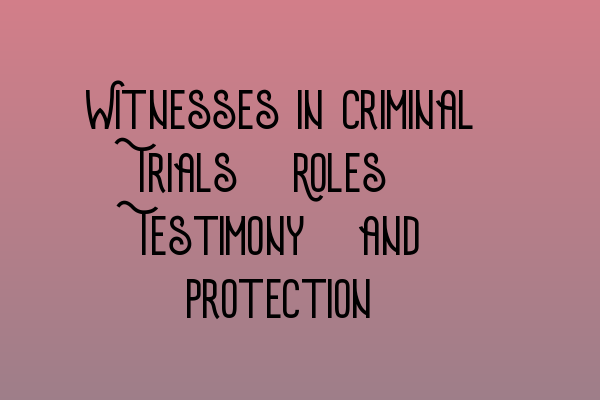Witnesses in Criminal Trials: Roles, Testimony, and Protection
When it comes to criminal trials, witnesses play a crucial role in the pursuit of justice. Their testimony can often be the deciding factor in determining guilt or innocence. In this blog post, we will explore the various roles witnesses play in criminal trials, the types of testimony they provide, and the importance of witness protection.
The Role of Witnesses
Witnesses are individuals who have firsthand knowledge of the events related to a crime. They may have seen or heard something that is pertinent to the case. The role of witnesses in a criminal trial is to provide their account of what they witnessed, under oath, to assist in determining the truth.
Click here to learn more about preparing for the SQE 1 Practice Exam Questions.
Types of Witnesses
There are several types of witnesses that may be called to testify in a criminal trial:
- Eyewitnesses: These witnesses have directly seen the alleged crime taking place and can provide detailed accounts of what they observed.
- Expert Witnesses: These individuals have specialized knowledge or skills in a particular field relevant to the case. They are called upon to provide their expert opinion or analysis based on the evidence presented.
- Character Witnesses: These witnesses are called to testify about the character of the defendant or the victim. They can provide insights into the moral character, reputation, or behavior of the individuals involved in the case.
SQE 1 Practice Mocks FLK1 FLK2 can help you in preparing for the SQE 1 Practice Exam.
Testimony of Witnesses
During a criminal trial, witnesses are called to the stand and swear an oath to provide truthful testimony. They are then questioned by the prosecution, defense, and sometimes the judge. Witness testimony can include:
- Direct Examination: The initial questioning of the witness by the party who called them. It aims to establish credibility and elicit relevant details from the witness.
- Cross-Examination: The opposing party questions the witness to challenge their credibility or to clarify any inconsistencies in their testimony.
- Re-Examination: The party who called the witness may ask additional questions to clarify or reinforce their testimony after cross-examination.
If you are preparing for the SQE exams, make sure to check out the SQE 2 Preparation Courses and SQE 1 Preparation Courses offered by SQE Criminal Law & Practice Law UK.
Protecting Witnesses
Witness protection is a vital component of the criminal justice system. It ensures the safety and well-being of witnesses who may be at risk due to their involvement in a trial. Witness protection programs may include:
- Identity Protection: Witnesses may be given new identities to prevent their attackers or those involved in the case from finding them.
- Physical Protection: Measures may be taken to ensure the physical safety of witnesses, such as providing security details or relocating them to a secure location.
- Legal Protection: Witnesses may receive legal assistance and support to navigate the legal system and deal with any potential threats or harassment.
To stay informed about the latest SRA SQE exam dates, visit SRA SQE Exam Dates.
Overall, witnesses play a vital role in criminal trials, providing firsthand accounts and expert opinions to help determine the truth. The protection of witnesses is of utmost importance, ensuring their safety and allowing them to contribute to the pursuit of justice without fear. By understanding the various roles witnesses play, the types of testimony they provide, and the importance of their protection, we can ensure a fair and effective criminal justice system.
